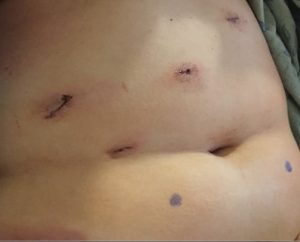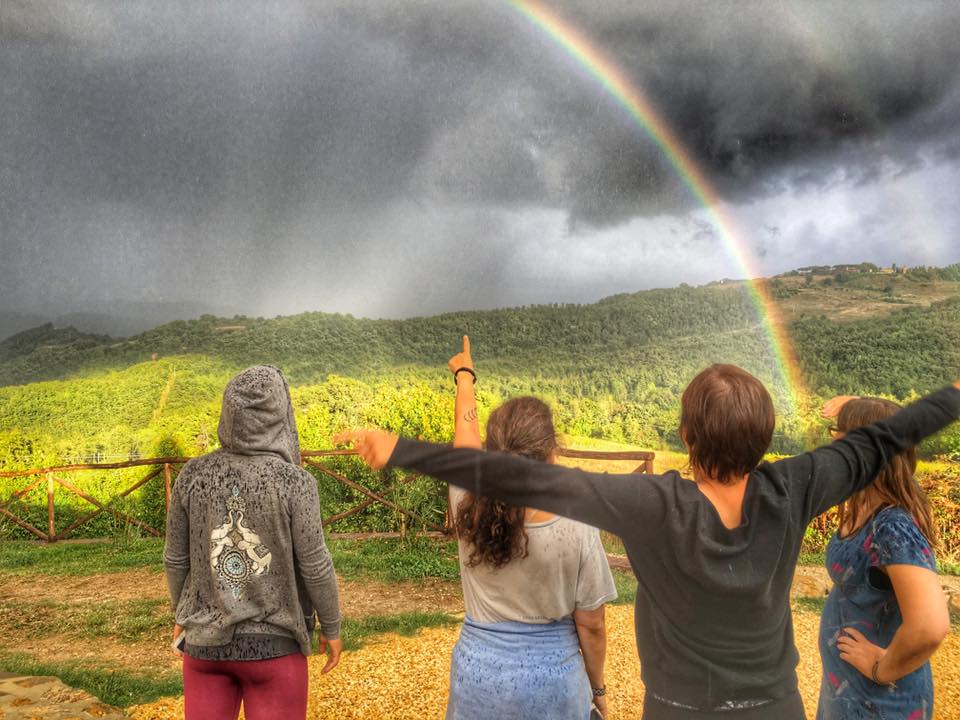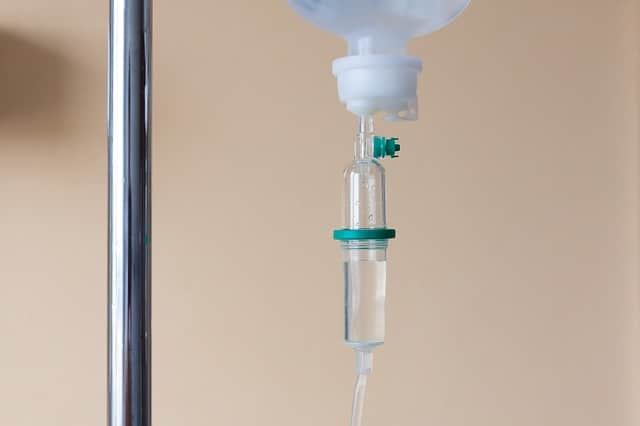By Laraine Herring
You’re separated from your family at 5:30 am and taken with a group of six down a wood-paneled hallway into an older, darker portion of the hospital. You’re assigned a bed and given a plastic bag for your clothes. You have to take your third pregnancy test in three days because, why the eff not, even though you haven’t had anything to eat and very little but Gatorade mixed with Miralax in three days in preparation for your second colonoscopy in two weeks and the colon resection surgery, and besides, all that rectal bleeding from the malignant tumor didn’t make you feel very sexy. You wonder if men have to take a fertility test before surgery. Seems only fair.
You tell them your name, again, confirm your birthday, again, and they scan your barcode on your ID bracelet, which is next to a wristband that contains the numbers for your blood vials, which are stored somewhere in the building should you need a blood transfusion, permission for which you had to give 48 hours previously. Your allergies are marked on a red band, and now you have three bracelets.
Judy the ostomy nurse comes in and you like her, but you’re afraid of her because of what she means. She tells you your belly is perfect for a colostomy bag as she puts two blue dots where the bag would go, and since it is, you won’t need one, but you know she must say that to all the bellies, all the days, before all the surgeries. Still, you like her and very few people have said your belly was perfect. The anesthesiologist comes in and you again confirm your name and date of birth and she scans your barcode and tries to assure you that she — that they all — have done this before. She tells you what they will be giving you, how they will be monitoring you, but though you have two graduate degrees, you do not have a medical degree and you have no idea what she is saying.
Your doctor comes in after you’re hooked up with your IV and your various other medicines that you don’t understand but you put in your mouth anyway because those are the rules. He fistbumps you and leaves. Your feet are strapped in compression socks and held to the bed in automatic compression sleeves, which squeeze your calves every sixty seconds. They are tethers to the bed. Tethers to the earth. You hate anything on your toes, but you don’t want a blood clot, and they don’t appear optional, and you most definitely want the tumor out — you’ve already paid for it — so you don’t say anything.
They told you you would be slightly upside down, with a ventilator tube, so that the belly would be most exposed, most available to Eva, the floor-to-ceiling robot who will be cutting you open, lifting your colon into the bracing air, and excising the cancer. You don’t remember the ventilator tube, but you felt the rawness on the roof of your mouth like they told you you would. You have never worn a bikini. You have never worn a belly shirt. But now everything depends on your opening up your most yin side — your most vulnerable parts — to fluorescent lights and strangers in masks and gloves. And you have to open. You have to welcome in the robot so that your body won’t be afraid. So that when this is over and Eva is done, your body will grasp itself with love and rebuild its muscles because it knows that we’re in this together–for the long game. Your beautiful, beautiful body.
Whatever they give you upon leaving pre-op kicks in before reaching the operating room and you never see the room. Never see the floor-to-ceiling robot named Eva who will be doing the cutting and the sewing and the biopsying. You are glad her name is Eva and you are glad that you are with people who would name a robot and you are sure your surgeon has done this before and all will be well. But you don’t think any of that in the operating room because you don’t have any awareness there.
You wake up in post-op. First thought: You are not dead. Second thought: Is there a colostomy bag? Your hand goes to your belly and feels only your flesh. Your body is wracked with pain from the gas they blew into your belly so they had room for Eva to work. There is nowhere for it to go. It has to take its time. You have to wait it out. You’ve felt very little physical pain in your life, and it is strange that the body takes its own way without your mind to stop it or control it. You can’t roll over because of the compression socks and there’s a strange tightness in your belly as if you didn’t really 
You watch your body contract and expand, trying to shift on the tiny bed, which has your feet held prisoner in the ever-compressing compression sleeves and you have a moment of clarity in which you realize that you are calm, even as your body screeches. You float inside of it. You are not it.
You’re hot, so they bring you ice. You’re cold, so they take it away. Someone wipes your mouth with a swab because you’re so thirsty but you can’t drink anything yet. You think you’re a horse, baring her teeth for a brush. You press your morphine button because you can. You don’t really see anyone’s faces. Only their hands. The 10,000 hands that are always with us all.
You wait in post-op for six hours until a room is ready. You are regaining some lucidity and you are ready for a different gown. A shower. A fucking cheeseburger. But there’s none of that. You’re sweaty and your hair is matted to your head. But there is no colostomy bag. You have a catheter and a urine bag, but that is OK.
You are alive.
And there are 10,000 hands.
They take you up to your room and just like in the movies, six pairs of hands, three on each side, lift you on your sweaty sheet onto the new bed. They roll you onto one side and pull the sheet out. They roll you onto the other and straighten a new one. Your room has two windows and a bathroom, but you remain tethered to the bed with compression sleeves, a catheter, and an IV drip for food and a morphine drip. You can’t eat. You want to. You want to sleep. You want to roll into a ball. You want to storm the castle and say hell, yes, I am here. But all you can do is hit the morphine button, which doesn’t do much except make things fuzzy. You don’t like it. The pain is better, so you start to wean yourself off the morphine and on post-op day two, they take it away, along with the catheter and the urine bag and the IV feeding tube. You remove the compression sleeves because you hate them and you hide your feet under the bed when the nurses come in. You massage your legs yourself. You walk around the hospital on your own. You are over it.
You get to move from clear liquids to full liquids, which is essentially ice cream, which is not really that good for you, and you feel that you have too much sugar too fast. It’s been five days since you have had solid food. The next day, you get to move to a low-residue diet, which you’re still on, which is mostly bananas, white bread, eggs, processed pastas, and clear liquids. You want your resection to stay together, so you buy foods you’ve moved away from over the years as you’ve pushed toward eating more healthfully. You’ve already lost 15 pounds since the first colonoscopy. Maybe you’ll write a weight-loss guide and finally get to meet Oprah.
You have to hold your IV hand outside the shower door because they left the tubing in your hand just in case, but still you take a one-armed shower all by yourself and you are the fucking bomb. You brush your teeth in a sink, not a plastic tub. The nurses say you can have either Oxycodone or Tylenol and you laugh. Is there nothing in the middle? But there isn’t, so you take two Tylenol at 350 mg each and call it a night. You use your aromatherapy oils from your massage therapist: Release and Trauma. You put on your chakra balancing music on your iPad. You hold your belly in your hands and tell it she is the most beautiful thing. That your whole body is the strongest, most beautiful thing.
The next morning you want some more Tylenol and the nurse says you’re only allowed one Tylenol and you laugh and tell her you can walk across the street to CVS and buy Tylenol in 500 mg tablets and take ten of them, and just last night they were offering Oxycodone. You call them fickle and everyone laughs. You like your nurses. They like you. You are not interested in staying here. You are not interested in being identified with your surgery. You are interested in rebuilding.
You talk to them and make jokes and they start to tell you about their lives and you sit in the hall together and look at the photographs. One of them tells you about her own cancer scare. Another tells you about the death of her daughter, and you just sit together on the bench, a picture of Bryce Canyon in front of you. You miss them when you leave.
You walk out four days later. No Tylenol. No prescriptions. Five robot kisses on your belly, a large incision above the pubic bone, and two perineum incisions. As you prepare to leave your room, 2611, you give thanks to it for holding you in the dark, for all the machines that beeped and compressed and fed and drained you. You write a thank you note to the nurses of post-surgical oncology, and a note to your surgeon.
Your tumor is gone. There is no cancer in the lymph nodes. You are the luckiest woman on the planet, but not because the outcome was so good. You are the luckiest woman on the planet because you touched the 10,000 hands, and you said thank you to them. You felt, especially in post-op, that no matter what is happening, all is well. You felt the eternal part of you–the part that one day will be stardust–and you now know in your body what you have observed as you’ve watched the illnesses and deaths of others.
You are not alone.
There are 10,000 hands. Everywhere. Their job is to hold you, and when the moment is perfect, set you free.



